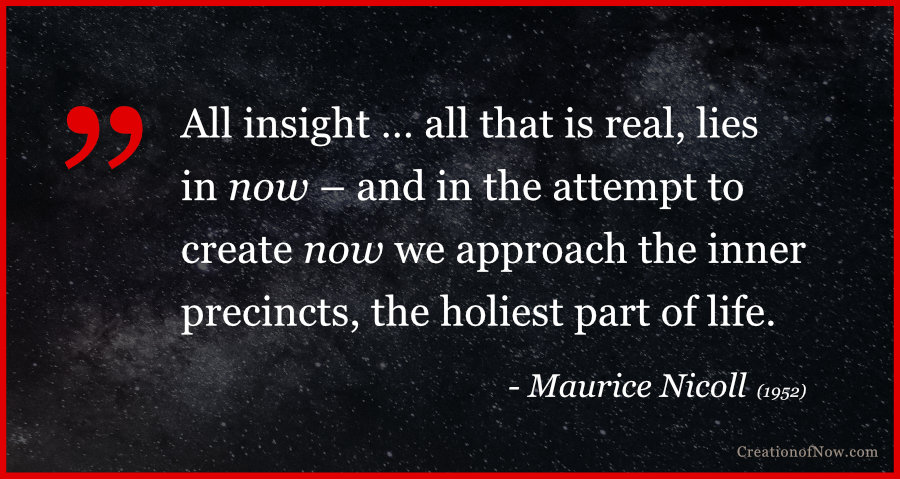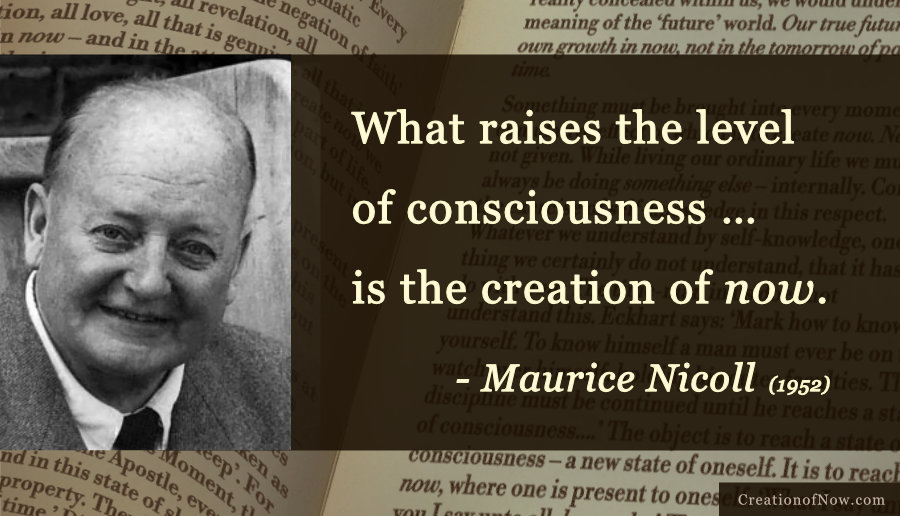 This site mainly explores how a little-known Fourth Way teacher, Maurice Nicoll, who coined the phrase “creation of now,” has significantly influenced contemporary spirituality.
This site mainly explores how a little-known Fourth Way teacher, Maurice Nicoll, who coined the phrase “creation of now,” has significantly influenced contemporary spirituality.
Being more conscious, aware or mindful in the present moment is a widely-recognised spiritual or psychological idea today, but it wasn’t always so.
In the early 20th century, an enigmatic teacher named Gurdjieff brought a teaching to the West about raising one’s state of consciousness in regular life, and observing one’s unconscious reactions without identification. The idea that we’re normally “asleep” in “waking life” and need to “wake up” seemed revelatory to many at the time. While he taught much else too, it’s this idea that’s arguably been most pervasive.
This teaching, known as the Fourth Way, had a profound impact on Russian writer and esotericist P.D. Ouspensky, who raised its profile in the English-speaking world. Another major expositor was Dr Maurice Nicoll, a psychiatrist who left the tutelage of the famous Carl Jung to study with both Gurdjieff and Ouspensky, before spending his last decades teaching the Fourth Way.
I believe Nicoll’s extensive writing on the applied, psychological side of this teaching, often called “The Work,” has been very influential. Published near the end of his life in the early 1950s, his output focused on how to live consciously in daily life for self-knowledge and inner change—well before the modern mindfulness movement and New Age writers on “the Now” were in vogue.
This site takes its name from a phrase he coined. Nicoll called the act of becoming conscious or “present to oneself” in the moment “the creation of now.” [1] The present moment “only becomes now in its full meaning if a man is conscious,” he also wrote.[2] One of my early articles, incorporating this phrase, examines the broad influence of the Fourth Way on present-moment practice in the West. Yet my main focus here is showing how Nicoll in particular, despite his obscurity, has had a significant, but mostly unrecognised, influence in this sphere.
One of my early articles, incorporating this phrase, examines the broad influence of the Fourth Way on present-moment practice in the West. Yet my main focus here is showing how Nicoll in particular, despite his obscurity, has had a significant, but mostly unrecognised, influence in this sphere.
The area Nicoll largely wrote about he sometimes called “esoteric psychology.” This includes not just present-moment practice, but a whole discipline of self-knowledge aimed at inner transformation understood within a cosmological framework. He deftly entwined parallel threads from other sources to explain this subject in a vivid, practical way, leaving behind a rich and extensive resource. Despite his obscurity, his influence reaches into the mainstream today, yet few recognise it.
To explore signs of this influence, I’ve been comparing Nicoll’s work to that of Eckhart Tolle, a bestselling contemporary author and extremely popular independent teacher—championed by Oprah Winfrey and other celebrities—who covers many similar topics. I’ve documented several corresponding ideas and expressions in their work on subjects like self-observation, self-identity and how “the law of opposites” governs inner states in my comparative analyses of their work. Along the way, I’ve also surveyed another of Tolle’s major influences, Barry Long, while probing Tolle’s concept of the emotional “pain-body.”
A slideshow of quote comparisons highlights some prominent selections from my research into these similarities. Currently I’m writing shorter summaries of the commonalities I’ve found. These articles present similar author statements, on given topics, side-by-side in two column tables for direct comparison. You can read these here.
For background on Nicoll, see my biographical article. For more on Gurdjieff and the Fourth Way, read this first.
A little about me and why I write here
I’ve been studying what broadly falls under the term “esoteric psychology” for many years, but my interest is mostly personal—as a practitioner—rather than an academic one.
In this particular sphere of western esotericism, self-knowledge carries both spiritual and psychological meanings. It expresses the ancient idea that by knowing oneself, and undergoing self-change, one can live in closer accord with divinity, and that self-knowledge is inseparable from understanding the cosmos. Unlike most modern psychology, it holds that we live in a meaningful universe with higher purpose and spiritual intelligence behind it. But such a teaching cannot just be theory or philosophy: it must include a practical method you can use. The main practice discussed by sources examined here is self-observation.
My motivation to learn ways to acquire self-knowledge, change within, and lead a deeper, more fulfilling life, more attuned with spiritual principles, is what drew me to this field. A number of contemporary figures have provided a practical approach to such studies, which generally involves methods of self-study, like self-observation, connected with a higher spiritual aim. I can gratefully say that practicing this has brought positive changes and a deeper purpose to my life.
So, these ideas matter to me, which is why I write here at all. But, on this site, I’m standing back and looking at this subject impersonally, so I can impartially document the prevalence and passage of some of these ideas in our culture. I have no aim to try to “teach” anything; however, my experience as a practitioner does give me perspectives a purely intellectual approach could not. I should say upfront though, that I have no affiliation with any Fourth Way groups. I write out of personal valuation and interest.
I aim to trace certain ideas belonging to this field in the modern landscape and discuss their cultural and philosophical significance: how they emerged, took root, branched out, spread and the impact and influence they’ve had in the 20th century and beyond. I hope in time to trace overlapping currents of influence, and compare and contrast the different ways such ideas have been approached and where and how they have diverged in certain important ways.
